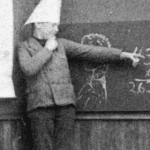
I published this column in the Provo Daily Herald on 28 July 1999:
During a rambling, all-night discussion in the late 1960s, a famous Nobel laureate physicist told a group of college students that, though he loved C. S. Lewis’s science fiction novels, he hated the “religious propaganda” that Lewis tacked on to them.
Mr. Feynman was wrong. The religious themes of C. S. Lewis’s stories are far from “tacked on.” They are central to his fiction, as they are to virtually everything he wrote. At first, Lewis’s conversion to Christianity following years of atheism could scarcely be described as enthusiastic: “In the Trinity Term of 1929,” he later wrote of his student days at Oxford University, “I gave in, and admitted that God was God, and knelt and prayed: perhaps, that night, the most dejected and reluctant convert in all England.” His reluctance soon left him, however, and he became, as William F. Buckley once described him, the most convinced and convincing Christian writer of his generation.
While building a distinguished scholarly career, first at Oxford and then at Cambridge, Lewis also managed to pour out a stream of essays, novels, and theological works that sold widely and brought him a legion of admirers throughout the English-speaking world. He was at the center of a small rebellion in British university life during the thirties and beyond. With his friends Charles Williams, Dorothy Sayers, and J. R. R. Tolkien, he was a committed Christian author at a time when religion enjoyed little prestige among intellectuals.
C. S. Lewis’s death on 22 November 1963 was obscured by the assassination of John F. Kennedy on that same day. But Lewis’s fame and popularity have continued to soar, and numerous events during the current year will commemorate the centennial of his northern Irish birth in 1898 .
Why does he remain so popular? There are many reasons. He was, for one thing, a brilliant writer. He is fun to read, endlessly quotable, with a good sense of humor and a marvelous gift for story telling. His imagination was rich and well-stocked with vast learning, which he managed to wear quite lightly, indeed effortlessly. He did not disdain writing for ordinary people. In fact, he once proposed that every divinity student at Oxford should be required to explain sophisticated theological doctrines to Royal Air Force mechanics before taking a degree. These were intelligent men, Lewis reasoned, but not intellectuals and not very patient with jargon. If the student could not explain a difficult concept to them, it was because he did not understand it himself.
Lewis is approachable because, although he was a powerful thinker, he wrote about everyday realities of human behavior, of prayer and moral struggle, rather than about bloodless abstractions. He saw those realities for what religious people have generally claimed them to be: the arena where eternally significant choices are made, the field of battle between the divine and the diabolical. There is far more human insight in his famous Screwtape Letters or in the less well known but brilliant Till We Have Faces than in many a ponderous volume of scientific psychology.
Christians who lament the low state of the culture around them, who fear its moral effect on their children, could do far worse than to read aloud to their children from Lewis’s rich, Christ-centered Chronicles of Narnia. They would do well to take a few hours away from television or the latest hit film to enter into the excitement of his Perelandra trilogy and, along the way, to ponder its profound treatment of redemptive suffering, temptation, and the reality of evil.
Once, explaining why bowing or kneeling in prayer really matters, Lewis commented that it was necessary for the body to pray, as well as the spirit. In a similar way, one might say that, to be truly converted, spiritually, the imagination must be baptized, and not merely the body or even the mind. C. S. Lewis — as much, perhaps, as any modern writer in any theological tradition — had the ability to make his readers feel religiously, as well as to lead them to think about religion. His writings feed the mind, but they also nourish the heart. Few writers have been so successful in accomplishing that.












